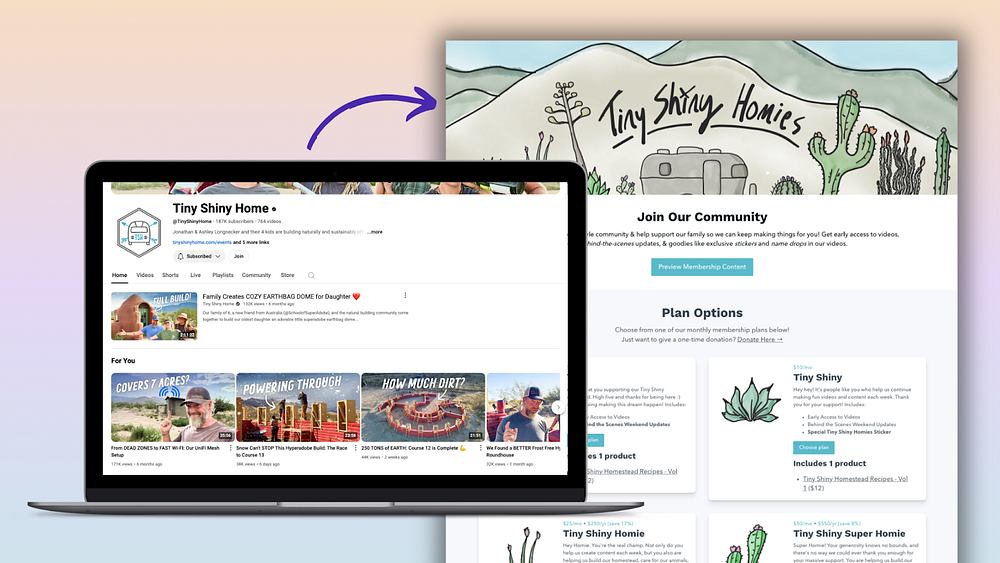Whether you’re launching a personal brand or starting a small business, you need a website. Your website is your home on the internet. But building a website from scratch for the first time can be daunting — and expensive.
Luckily, you don’t need to know how to code, have an eye for website design, or spend an arm and a leg to create a great website. Website builders make assembling your site easy, fast, and affordable.
In this article, we’re sharing seven of the best website builders for small businesses and creators who want to create a website that looks good without hours of work or a hefty price tag.
1. Podia

Podia is an all-in-one platform for building websites and selling courses and digital products. The website builder is clean, customizable, and so user-friendly that you can have your site ready in just 10 minutes.
With Podia’s intuitive website builder, you don’t need to know a single line of code to make your site look amazing. Customize your site with color schemes, brand styles, fonts, logos, stock photos, and loads of content blocks to choose from.

Within each content block, you can customize the content and design to create a website that’s true to you and your brand. You can even embed podcasts, videos, and widgets from 1900+ other apps directly onto your Podia site.
All Podia sites have an SSL certificate and are automatically optimized for mobile. Plus, Podia makes it easy to add Google Analytics to your site to track visitors and sales.
Podia creator and Flex Lessons founder Joseph D’Amico says, “Podia makes website building so fun. I feel like I could set up a site in an afternoon, and it would look great. And there’s something to be said for how pretty it is. It’s the best-looking one by far.”

Beyond a site with unlimited pages (and no ads), Podia’s plans also come with email marketing tools and the ability to sell unlimited digital downloads and coaching products.
In other words, you can build a powerful and profitable online presence — which helps Podia score a 90.91 on the Creator Friendliness Index.
The Creator Friendliness Index uses 20 ranking factors to gauge how friendly a company’s policies are for creators. Podia ranks well across friendliness factors, ways to remove transaction fees, and multiple currencies and integrations.
Ready to learn more? Get started building your website with a 30-day free trial to see Podia in action.
2. Wix

Wix is a website builder that lets users create simple free websites. With Wix, you can set up a storefront, blog, or business website using a drag-and-drop editor with hundreds of modern templates.
Wix’s site builder is intuitive, even if you don’t have design chops. You can also get help from Wix’s unique Artificial Design Intelligence (ADI) tool, which uses artificial intelligence to design a custom site for your brand. Your Wix website also has built-in search engine optimization (SEO) tools.
The biggest downside to Wix’s free plan is the Wix banner ad on every page. It’s hard to make your website look professional when that’s the first thing visitors see. To remove the Wix banner ad, you’ll need to be on the Combo plan ($16/month) or higher.

If you want to sell products on your Wix site, you’ll need to upgrade to a paid plan for ecommerce features. Wix is also missing a built-in community platform or membership tool. There are storage space limits on all plans, which makes it tricky for visual content creators to showcase their work.
Wix scores 79.22 on the Creator Friendliness Index. It earns points for its free plan and the low cost of its paid plans. It loses points for artificially limiting the number of products a creator can sell by plan tier and limited support documentation.
3. WordPress

WordPress is free, open-source content management system (CMS) software that’s popular as a blogging platform and website builder.
There are two ways you can use WordPress to build your website: Self-hosted and managed hosting.
With a self-hosted WordPress.org site, you must purchase a custom domain name, sign up for website hosting services, and install WordPress. From there, you can add your favorite themes, tools, and plugins to customize your website.
Using WordPress for your self-hosted site is free, but factor in domain name registration, web hosting, paid themes, and pricey plugins, and costs quickly add up.
Your second option is to build your website with WordPress.com managed hosting. WordPress.com offers a free plan and several paid plans.

With the free version of WordPress.com, you can set up a simple site with 1GB of storage, pre-installed themes, and built-in SEO tools — but that’s all you get.
The free plan on WordPress also limits your customization options and displays ads on your website. You can’t connect a domain name, add functionality with plugins, or sell online courses with WordPress.
WordPress has a steep learning curve. There’s no drag-and-drop website editor, so if you want to customize your site fully, you’ll need HTML and CSS knowledge. You can outsource the work to a web design pro or WordPress developer, but that adds another cost to set up your site.
WordPress scores 68.33 on the Creator Friendliness Index. It earns points for its free plans, integrations, and language support but loses points for its lack of available customer support.
4. Weebly

Weebly is an ecommerce platform and website builder owned by Square.
The Weebly website builder is beginner-friendly and offers customizable templates. You can add custom CSS and HTML, and the App Center lets you connect extensions and integrations for added functionality.
Plus, web hosting is included on all plans, and you can buy your own domain name directly through Weebly. If you aren’t ready to buy a domain name, you can use a free subdomain, like yournamehere.weebly.com.
Weebly has blogging tools for sharing content, an App Center for adding extra functionality, and analytics so you can track how your site is performing.
Because Square owns Weebly, it’s designed with ecommerce sites in mind. All plans, including the free plan, come with ecommerce functionality to build an online store and sell physical products.
Weebly’s free option does have its downsides. There are storage limitations, and you can’t sell digital products. Weebly will also display Square ads on Free and Personal plans, so you’ll need to upgrade to a premium plan to remove them.
All in all, Weebly is a solid choice for beginners who don’t have extensive website experience, especially if you plan to sell physical products online.
5. SITE123

SITE123 is a straightforward free site builder for beginners looking to establish an online presence. As the name implies, SITE123 makes building a website as easy as one, two, three:
-
Select your website type. Choose from templates for a business, blog, event page, service provider, and more.
-
Add your business name, content, and images.
-
Publish your website.
All of the templates on SITE123 are fully responsive and come with free web hosting, 500MB of storage, and 1GB of bandwidth.
One big catch: The free plan limits your ability to customize fonts, colors, and other design elements. You must upgrade to a paid plan to unlock plugins, apps, and full template customization options. There are also no free ecommerce tools.
Finally, you can’t switch website templates once you’ve started building your site. If you do, you’ll lose all your content. That can be a major hassle.
Bottom line: SITE123 doesn’t give you much creative control over your free site. But if you need a simple, no-frills landing page for your business, the free plan offers just enough to get by.
6. GoDaddy

GoDaddy is known as a web hosting service and domain name registrar, but it also offers a free website builder with limited ecommerce tools. Choose a template, add your content and business info, and you’ll have a website ready to launch in just a few steps.
Your free site includes email marketing tools, one-time appointment setting, analytics, and SSL certificates. Another feature that makes GoDaddy stand out among free platforms is 24/7 customer support and community forums, so you have plenty of resources if you get stuck.
The free plan does have its limits. You’ll need to use a godaddysites.com subdomain, and GoDaddy will display an ad at the top of all pages on your site. Tools like SEO, recurring appointments, complete online store features, and custom domains are only available on paid plans.
All things considered, GoDaddy’s free plan is a solid option for personal sites, but the heavy branding at the top of every page can make a business site seem unprofessional.
7. Jimdo

Jimdo is a simple free website builder that lets you create a business website in just a few steps:
-
Answer a few questions about your website.
-
Pull in business info from your social media accounts.
-
Choose a design.
-
Publish your site!
The Jimdo image library gives you access to a wide array of professional stock photos. You can also add contact forms for customers to get in touch.
Jimdo’s site creation wizard makes it easy to build a website, but the trade-off is a lack of customization. You can pick from a few preset layouts and different color combinations.
On the free plan, you have to use a jimdo.com subdomain, and there’s a Jimdo ad on every page. You get 2GB bandwidth and 500MB of storage and can have up to five pages on your website. Finally, you don’t have access to any customer support, meaning you’re on your own if you need help setting up your site.
If you need a simple one-page site and feel confident you won’t need customer support, Jimdo could be an okay choice, but the free version is one of the most limiting options on this list.
Choose a website builder designed with your growth in mind
Not all website builders are created equal. As you evaluate different options, keep an eye out for sneaky ways that platforms add costs to a “free” tool: hidden upsells, added fees, limits on the number of web pages or customization options, or unremovable ads. You don’t want to find yourself running into surprise costs in the middle of launching your site.
In other words, choose a creator-friendly platform that prioritizes your needs and growth through ease of use and transparent pricing.
With Podia, you can create a beautiful website for your business in just a few steps. It’s the best website builder for creators who want to build an online home base for their business — without the technical headache or steep price tag.
Design a beautiful website, sell your work, and share your story. We can’t wait to see what you create. Build your Podia website today with a 30-day free trial.



